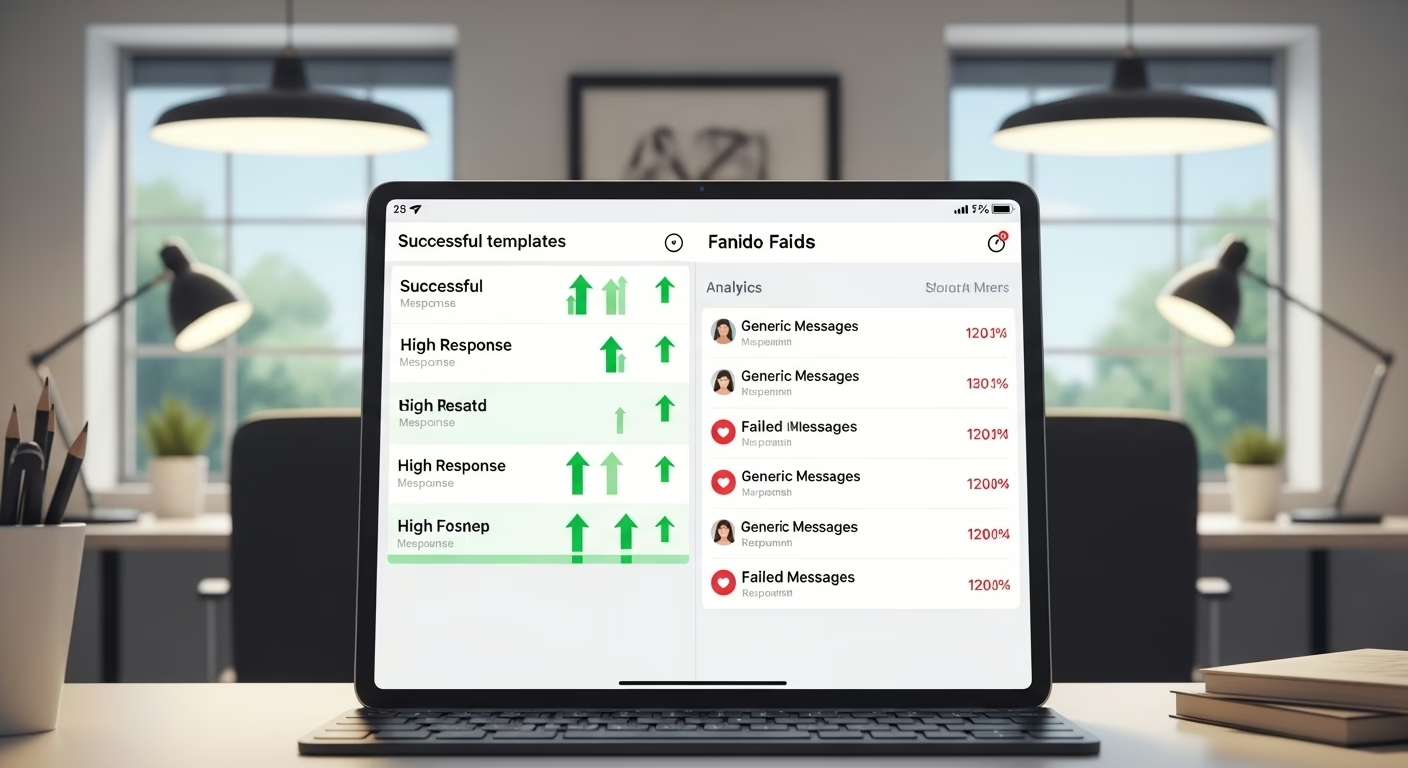The Psychology Behind Why Pickup Lines Work (Or Don’t)
The Science of Seduction: What Psychology Reveals About Pickup Line Success – The effectiveness of pickup lines hinges on complex cognitive and emotional processes.
Pattern recognition and mirror neurons in the brain generate instant responses to these lines. Humor and surprise can trigger dopamine, enhancing attraction.
Confidence and simplicity often lead to success, while insincerity tends to fail. Cultural and individual variances, like personality traits, impact receptivity.
Understanding these dynamics offers insights into why some pickup lines resonate while others fall flat, inviting further exploration into this intriguing subject.
Key Takeaways
Hide- Mirror neurons trigger emotional responses, influencing instant attraction to pickup lines.
- Unexpected humor in pickup lines releases dopamine, fostering connection through laughter.
- Simplicity and clarity in pickup lines enhance cognitive processing, increasing effectiveness.
- Cultural and regional differences impact humor appreciation and pickup line success.
- Personality traits and attachment styles shape individual reactions to pickup lines.
The Neuroscience of First Impressions in Digital Dating
In the domain of digital dating, the brain’s ability to process opening messages in under three seconds is vital for forming first impressions.
This rapid evaluation relies heavily on pattern recognition, allowing individuals to quickly assess message relevance and authenticity.
Also read: 300 Best Pickup Lines That Actually Work in 2025
Cognitive load theory suggests that the efficiency of this process can be enhanced by reducing extraneous information, thereby streamlining message comprehension and response.
How Your Brain Processes Opening Messages in Under Three Seconds
Recent studies suggest that within the first three seconds of reading a message, the brain’s mirror neurons play a vital role in creating an emotional response, influencing attraction.
These neurons are believed to simulate the emotions conveyed by the sender, potentially explaining why certain lines can evoke immediate positive feelings.
Understanding this process can aid in crafting more effective opening messages, offering insights into the psychology behind successful digital communication.
The Role of Mirror Neurons in Text-Based Attraction
How swiftly does the brain evaluate a new message in the digital dating world? Within seconds, mirror neurons engage, fostering virtual chemistry.
They interpret tone matching, assess message timing, and detect playful teasing, all contributing to an impression of confidence cues.
This rapid processing influences attraction by mirroring emotions and intentions, creating a nuanced understanding that considerably impacts text-based relationships.
Why Some Lines Trigger Instant Positive Responses
What makes certain opening lines spark immediate interest in digital dating? Neuroscience suggests that the brain processes silent signals akin to eye contact, even through text.
Engaging openers that evoke familiarity and warmth can trigger positive responses quickly.
Analyzing these elements can enhance understanding:
- Silent signals mimic face-to-face interactions.
- Eye contact effects occur even in digital form.
- Emotional warmth fosters connection.
The Science of Pattern Recognition in Dating App Conversations
In the context of digital dating, the brain’s capacity for pattern recognition plays a pivotal role in how individuals perceive and respond to messages.
Research indicates that familiar messages may trigger predictable neural responses, whereas unique or unexpectedly humorous messages can stimulate dopamine release, enhancing engagement.
Tools like FlirtoByte can be useful in crafting these types of messages, offering categorized suggestions to optimize first impressions by utilizing the neuroscience of surprise and novelty.
How Familiar vs. Unique Messages Affect Brain Chemistry
Why do certain messages resonate more than others in the sphere of digital dating? The answer lies in how familiar versus unique messages influence brain chemistry.
Effective communication often hinges on:
- Humor timing: Aligning jokes with personality matching enhances response triggers.
- Confidence cues: Familiar messages can boost perceived confidence.
- Cultural humor: Unique messages that resonate culturally create strong impressions.
Tools like FlirtoByte can aid in mastering these nuances.
The Dopamine Release Triggered by Unexpected Humor
Unexpected humor in digital dating conversations can trigger a release of dopamine, a neurotransmitter associated with pleasure and reward in the brain.
When humor effectiveness aligns with surprise triggers, it enhances laughter bonding, creating a stronger initial connection.
Comedic timing and diverse humor types play vital roles in this mechanism, influencing how individuals perceive and respond to humorous stimuli, ultimately shaping their first impressions.
Cognitive Load Theory and Message Processing
In digital dating, cognitive load theory suggests that simple lines often outperform complex ones due to the limited mental capacity available for processing new information.
High cognitive load can hinder decision-making, as individuals in swipe culture are required to make swift judgments with minimal mental energy.
This emphasizes the importance of concise communication in initial interactions, where tools like FlirtoByte can assist users in crafting effective, straightforward openers.
Why Simple Lines Often Outperform Complex Ones
How do simple lines manage to create such a strong impact in the domain of digital dating? Simplicity reduces cognitive load, enhancing virtual chemistry through quick processing.
Simple lines often excel due to their:
- Emotional resonance: Elicits immediate responses by aligning with subtle cues.
- Tone perception: Easier to interpret correctly, minimizing misunderstandings.
- Message timing: Facilitates timely exchanges that maintain conversational flow.
Tools like FlirtoByte offer organized conversation starters that can serve as inspiration.
Mental Energy and Decision-Making in Swipe Culture
As individuals navigate the ever-evolving landscape of digital dating, their mental energy is considerably influenced by the cognitive demands of swipe culture.
The rapid decision-making process requires evaluating humor timing, eye contact, body language, voice tone, and personal boundaries.
These factors, compounded by the absence of traditional cues, can overload cognitive resources, challenging users to make meaningful connections.
Tools like FlirtoByte can assist in refining these nuanced skills.
The Psychological Triggers That Make Lines Memorable
The effectiveness of pickup lines often hinges on psychological triggers such as social proof, where validation from others can increase the perceived value of a message.
Additionally, the reciprocity principle plays a pivotal role; when a line offers something of interest or value, it can prompt a reciprocal response.
The curiosity gap theory further enhances message effectiveness by creating intrigue, encouraging the recipient to seek more information.
The use of confident language in opening messages can substantially influence perceived social value, as individuals are often drawn to those who appear self-assured.
Additionally, implied social connections within a message can enhance its memorability by suggesting a shared understanding or community.
These factors, rooted in social proof and validation, act as psychological triggers that can make pickup lines more effective in capturing attention and fostering engagement.
Confident language plays a pivotal role in signaling high social value within dating app conversations. Research indicates that verbal assertiveness and self-assurance cues enhance social signaling, creating an expressive tone that resonates with others.
Such communication styles are often associated with high social status.
- Encourages engagement through perceived competence
- Increases memorability of messages
- Fosters a sense of belonging and connection
Tools like FlirtoByte can help users develop these skills effectively.
How can individuals make their opening lines on dating apps more memorable? By utilizing virtual chemistry, emoji influence, and strategic message timing, they create a sense of social connection.
Integrating playful teasing and compliment strategies can enhance engagement, fostering a sense of belonging. Tools like FlirtoByte might assist users in finding personalized approaches, blending these elements effectively for impactful first impressions.
Reciprocity Principle in Conversation Starters
The reciprocity principle in conversation starters plays a vital role in creating memorable interactions by fostering a psychological sense of obligation.
When a question is posed, it invites a response, consequently initiating a balanced exchange of information that encourages continued dialogue.
This dynamic is essential for effective communication, as it not only prompts engagement but also establishes a framework for equitable interaction.
Why Asking Questions Creates Psychological Obligation
When engaging in conversations, particularly on dating apps, asking questions can create a psychological obligation rooted in the reciprocity principle.
This approach fosters virtual chemistry and emotional resonance through:
- Playful teasing: Invites humor timing and light-hearted exchanges.
- Confidence cues: Demonstrates interest and assertiveness.
- Meaningful dialogue: Encourages deeper connections beyond surface-level chats.
Tools like FlirtoByte can help users refine these techniques effectively.
The Balance Between Giving and Requesting Information
Exploring the psychology behind conversation dynamics, one finds that the interplay of giving and requesting information forms a foundation for effective communication, particularly in the context of dating apps.
Strategic use of emoji cues or morning messages can enhance engagement.
Creative metaphors, cultural references, and text timing further influence reciprocity, making exchanges memorable.
Tools like FlirtoByte can assist users in steering these nuanced conversational elements.
Curiosity Gap Theory and Message Effectiveness
The Curiosity Gap Theory posits that messages containing incomplete information can create a mental loop that compels individuals to seek closure by responding.
This psychological mechanism is particularly effective in the context of pickup lines, where the strategic use of ambiguity can enhance engagement.
Creating Mental Loops That Demand Responses
How do certain phrases captivate attention and compel responses? Through strategic use of psychological triggers, pickup lines create mental loops that demand engagement. Techniques include emoji cues and playful teasing, which capture interest by utilizing curiosity and tone matching.
Timing strategies and compliment psychology further enhance message effectiveness, fostering a sense of connection.
- Emoji cues
- Playful teasing
- Tone matching
Tools like FlirtoByte can offer insights into these strategies.
How Incomplete Information Drives Engagement
Building upon the concept of strategic engagement, incomplete information plays a significant role in intriguing attention and fostering interaction.
By utilizing curiosity gap theory, individuals can enhance message effectiveness through emoji cues and visual cues.
Recognizing cultural nuances and adjusting voice tone can further optimize response timing.
Such dynamic interplay can be observed in platforms like FlirtoByte, which aids users in refining these subtle conversational strategies.
Personality Psychology and Line Preferences
Personality psychology provides a framework for understanding how individual differences in traits, such as those described by the Big Five, influence the reception of pickup lines.
Additionally, attachment styles may dictate preferences for certain communication approaches, affecting how messages are perceived and responded to in dating contexts.
Cultural psychology further complicates this landscape by introducing regional preferences, suggesting that the effectiveness of a pickup line can vary markedly across different cultural settings.
The Big Five Personality Traits and Message Reception
The reception of pickup lines can substantially vary based on the Big Five personality traits, particularly concerning extroversion and introversion.
Extroverts may prefer direct and bold approaches, appreciating humor and spontaneity, while introverts might respond more favorably to thoughtful and personalized messages.
Similarly, individuals with high openness to experience are likely to appreciate humor and creativity in pickup lines, reflecting their receptivity to novel and imaginative exchanges.
How Extroverts vs. Introverts Respond to Different Styles
Understanding how extroverts and introverts respond to different conversational styles requires examining their distinct personality traits.
Extroverts often thrive on engaging verbal cues and body language.
While introverts may prefer subtle emotional echoes and eye contact.
The silent treatment can be more challenging for extroverts.
- Extroverts: Energized by verbal cues, body language
- Introverts: Attuned to emotional echoes, eye contact
- Silent Treatment: Affects extroverts more negatively
Openness to Experience and Humor Appreciation
When examining the role of personality psychology in line preferences, openness to experience emerges as a significant factor.
Individuals high in this trait often appreciate humor timing and cultural nuances, aligning their personalities with dynamic interactions.
This openness can provide confidence boosts and enhance rejection resilience. Such individuals may find tools like FlirtoByte useful for exploring diverse conversational styles that match their unique preferences.
Attachment Styles and Communication Preferences
Attachment styles markedly influence communication preferences in dating app interactions. Individuals with secure attachment tend to engage more openly and positively.
While those with anxious attachment may exhibit heightened sensitivity to perceived rejection.
Conversely, avoidant types might respond better to approaches that respect their need for space, suggesting that personalized strategies, potentially supported by tools like FlirtoByte, can enhance message effectiveness across diverse attachment styles.
Secure vs. Anxious Attachment in Dating App Interactions
How do attachment styles influence communication preferences on dating apps? Securely attached individuals often perceive humor positively and respond confidently, valuing timely exchanges.
Conversely, those with anxious attachment may scrutinize response timing and confidence cues, impacting their interactions.
Cultural differences further shape these dynamics, as diverse backgrounds interpret humor and attachment styles uniquely, influencing preferences for conversation starters.
- Attachment styles affect humor perception
- Response timing is essential for interaction
- Confidence cues vary across cultures
How Avoidant Types Respond to Different Approaches
Individuals with secure attachment styles often engage comfortably with dating app humor. However, those with avoidant tendencies exhibit different interaction patterns.
Avoidant types are sensitive to confidence cues and may respond to humor timing with caution. Profile consistency is essential, as it minimizes ghosting awareness and enhances response triggers.
Tools like FlirtoByte can aid users in crafting tailored approaches that respect these nuanced preferences.
Cultural Psychology and Regional Preferences
Cultural psychology suggests that geographic location can substantially influence how humor and charm are perceived in pickup lines, with certain regions favoring specific styles over others.
Additionally, the educational background of individuals may impact their preference for message complexity and sophistication, potentially affecting the success of various lines.
Understanding these regional and educational factors can guide individuals in tailoring their communication strategies to align with the personality traits prevalent in different cultural contexts.
Geographic Variations in Humor and Charm Reception
Why do certain pickup lines resonate in some regions while falling flat in others? The answer lies in the complex interplay of regional humor, cultural charm, and geographic wit.
Variations in language nuances and local slang influence how messages are perceived. Understanding these differences can enhance communication.
- Regional humor affects line effectiveness
- Cultural charm shapes reception
- Local slang alters interpretation
Educational Background Influence on Message Preferences
The influence of educational background on message preferences in dating contexts is a nuanced aspect of personality psychology. Individuals with advanced education may prioritize virtual chemistry and humor perception, valuing confidence signals and precise message timing.
Conversely, less formal education might emphasize immediate social validation. Understanding these dynamics can enhance interpersonal connections, with tools like FlirtoByte offering tailored conversation strategies that respect diverse educational influences.
The Psychology of Humor in Romantic Communication
Humor plays a significant role in romantic communication by fostering emotional bonds, as laughter triggers positive feelings and increases interpersonal attraction.
Different types of humor, such as affiliative or self-enhancing humor, can have varying psychological impacts on relationship dynamics.
Additionally, research indicates that gender differences in humor appreciation may influence how humor is used and received in romantic contexts.
Why Laughter Creates Instant Emotional Bonds
Research suggests that laughter plays a vital role in forming emotional connections due to its ability to trigger endorphin release, creating a sense of well-being and bonding.
Successful humor in romantic communication not only increases mutual attraction but also serves as an indicator of compatibility through shared laughter.
This phenomenon underscores the importance of humor as a strategic component in initial romantic interactions, enhancing the likelihood of a positive connection.
The Endorphin Release from Successful Humor
An intriguing aspect of romantic communication is the role of humor in fostering emotional connections. Humor and attraction often correlate due to laughter chemistry, where successful humor generates endorphin boosts.
This playful banter can solidify bonds through humor consistency, creating shared experiences.
- Endorphins enhance mood and promote attraction.
- Consistent humor fosters trust and rapport.
- Laughter establishes a positive emotional environment.
Why does laughter often serve as a powerful indicator of compatibility in romantic relationships?
Shared laughter reflects humor compatibility, suggesting a mutual understanding of playful teasing and inside jokes.
This comedic timing fosters emotional bonds, aligning with the desire for connection.
Tools like FlirtoByte can aid those struggling with humor in dating apps by offering AI-powered insights into effective conversational humor, enhancing compatibility discovery.
Different Types of Humor and Their Psychological Impact
Humor in romantic communication can be broadly categorized into self-deprecating and observational comedy, each with distinct psychological impacts.
Self-deprecating humor often fosters relatability and vulnerability, potentially enhancing emotional bonds.
Meanwhile, observational comedy can showcase intelligence and shared perspectives.
Conversely, edgy humor involves a risk-reward dynamic, where successful delivery may enhance attractiveness, but missteps could lead to misunderstandings or offense.
Self-Deprecating vs. Observational Comedy Effects
In the domain of romantic communication, the use of humor can greatly influence interpersonal dynamics and perceptions. Self-deprecating punchlines and observational comedy often resonate differently.
Emoji humor can soften self-deprecation, while humor timing and cultural humor differences impact effectiveness. Observational comedy relies on shared experiences, fostering connection.
- Emoji humor: Enhances relatability.
- Cultural humor differences: Vital for context.
- Humor timing: Essential for impact.
The Risk-Reward Psychology of Edgy Humor
The use of edgy humor in romantic communication often involves a delicate balance between risk and reward, as it can either enhance attraction or create discomfort.
Risk psychology suggests that confidence cues inherent in edgy humor may increase its humor impact, yet also elevate rejection fear.
Tools like FlirtoByte can help users navigate these dynamics by providing insights into effective humor strategies in dating contexts.
Gender Differences in Humor Appreciation
Research indicates that men and women process humorous messages differently, potentially influencing their effectiveness in romantic communication.
Men may often seek humor that highlights wit and cleverness, whereas women might appreciate humor that fosters connection and emotional resonance.
These differences can be seen as part of a broader cultural evolution in dating contexts, where humor serves diverse social functions depending on gender dynamics.
How Men and Women Process Funny Messages Differently
Humor plays a critical role in romantic communication, yet men and women often process funny messages differently due to distinct socialization patterns and psychological predispositions.
This divergence influences humor perception and the interpretation of confidence signals.
Variations in response timing, cultural humor, and personality matching further shape these differences.
- Men may favor humor as a confidence signal
- Women might prioritize context and timing
- Cultural humor affects individual preferences
Cultural Evolution of Humor in Dating Context
A significant aspect of romantic communication is the cultural evolution of humor, which shapes how individuals perceive and appreciate comedic exchanges.
Humor evolution reflects shifts in cultural humor, where comedy timing and humor stereotypes play pivotal roles.
Despite varying humor preferences, humor universality suggests an overarching appeal, bridging differences.
Understanding these dynamics can enhance interactions, as seen in tools like FlirtoByte, which adapt humor for dating contexts.
Confidence Psychology and Smooth Line Effectiveness
The effectiveness of smooth pickup lines is often linked to the perceived confidence of the individual delivering them, a phenomenon influenced by the Halo Effect, where one positive trait can enhance the perception of other traits.
Language choices in these interactions also function as status signals, subtly communicating social standing and competence.
Additionally, Social Dominance Theory suggests that individuals perceived as confident and dominant are more successful in romantic communication, as these traits are often associated with higher mate value.
The Halo Effect of Perceived Confidence
The halo effect of perceived confidence in pickup lines stems from their ability to convey emotional intelligence, making the speaker appear more attractive.
This effect relies on the balance between self-assurance and avoiding arrogance, which can enhance the perceived competence and charm of the individual.
Studies suggest that smooth lines can effectively signal confidence, thereby increasing the likelihood of positive social interactions.
How Smooth Lines Signal Emotional Intelligence
Why do smooth lines often convey an impression of emotional intelligence? They leverage subtle cues like emoji usage and text tone, enhancing the perceived confidence of the message sender.
Perfectly timed messages reveal attentiveness, while humorous exchanges and thoughtful profile photos foster connection, signaling empathy and understanding.
This dynamic interplay forms a foundation for perceived emotional intelligence in digital interactions.
- Emoji cues
- Text tone
- Message timing
The Attraction of Self-Assurance Without Arrogance
Smooth lines often project an impression of emotional intelligence, which naturally leads to the exploration of confidence without veering into arrogance.
This balance hinges on humor timing, confidence cues, and the art of subtle flirtation.
The emotional tone and message rhythm play vital roles in crafting an approachable aura. Perceived confidence can create a halo effect, fostering a sense of belonging and attraction without overstepping into conceit.
Status Signaling Through Language Choices
The use of sophisticated vocabulary in pickup lines can signal perceived intelligence, impacting how confidence is communicated through language.
Understated confidence, often conveyed through subtle linguistic choices, can enhance the effectiveness of pickup lines by projecting competence without overt arrogance.
This balance of language and psychological cues plays a pivotal role in the perceived status and appeal of the individual initiating the conversation.
Sophisticated Vocabulary and Perceived Intelligence
A sophisticated vocabulary often plays an essential role in signaling intelligence and confidence in social interactions, particularly within the domain of dating.
This approach appeals to cultural nuances and personality cues, enhancing emotional intelligence.
Humor authenticity further supports confidence signaling, making interactions more engaging.
- Use of complex language can imply intelligence.
- Tailoring vocabulary to cultural contexts is indispensable.
- Emotional intelligence enhances conversational effectiveness.
The Psychology of Understated Confidence
Understanding the psychology of understated confidence involves examining how subtle language choices can convey status and self-assurance in social interactions.
Cultural humor and language nuances often play a critical role, as do regional dating customs and non-verbal cues.
In digital settings, adhering to digital etiquette can enhance perceived confidence. FlirtoByte helps users navigate these complexities, providing insights into language and style adaptability across various dating platforms.
In the context of dating communication, Social Dominance Theory suggests that smooth pickup lines may signal leadership qualities by demonstrating confidence and charisma.
The effectiveness of such lines often hinges on the delicate balance between assertiveness and respect, as excessive dominance can be perceived as aggressive rather than attractive.
Understanding this balance is essential for individuals aiming to enhance their interpersonal interactions, potentially utilizing tools like FlirtoByte to refine their approach in a nuanced and respectful manner.
How Smooth Lines Indicate Leadership Qualities
Why do smooth lines often signal leadership qualities in dating contexts? Smooth lines convey a mysterious allure, leveraging confidence cues and humor timing to establish social dominance.
Their effectiveness is often rooted in cultural nuances that recognize these traits as indicative of leadership.
By mastering these elements, individuals can enhance their perceived leadership qualities, a strategy some users explore through apps like FlirtoByte.
- Mysterious allure
- Confidence cues
- Humor timing
The Balance Between Assertiveness and Respect
Smooth lines in dating often reflect an individual’s ability to balance assertiveness with respect, a dynamic explored through the lens of social dominance theory.
Effective communication involves virtual eye contact and precise compliment timing, which align with subtle teasing and tone modulation.
Personalized emojis can enhance these interactions, fostering connection.
Tools like FlirtoByte help users master these nuances, promoting authentic engagement in digital dating environments.
The Paradox of Choice in Modern Dating Psychology
In modern dating, the abundance of potential partners and communication options can lead to decision fatigue, impacting individuals’ ability to respond effectively to messages.
This phenomenon, coupled with the challenge of crafting a message that stands out in crowded inboxes, often results in analysis paralysis.
Tools like FlirtoByte can assist users in *steering through* these challenges by providing organized conversation starters, which may help streamline the decision-making process and enhance communication efficiency.
Decision Fatigue and Its Impact on Message Responses
In the domain of modern dating, an overwhelming number of choices can lead to decision fatigue, negatively impacting the quality of message responses.
This phenomenon often results in individuals defaulting to generic messages that easily get overlooked amidst the mental clutter of numerous potential matches.
Tools that organize and categorize conversation starters may serve as a practical aid, helping users to overcome choice overload and maintain meaningful engagement.
Why Too Many Options Reduce Response Quality
Many individuals guiding the modern dating landscape encounter the paradox of choice, where an abundance of options paradoxically leads to decision fatigue and diminished response quality.
This phenomenon affects emotional vulnerability and humor timing, influencing confidence signals and cultural differences.
Responses may suffer, highlighting the need for tools that simplify choices, such as:
- Rejection resilience: Building tolerance to rejection
- Confidence signals: Showing genuine interest
- Cultural differences: Navigating diverse backgrounds
How Generic Messages Get Lost in Mental Noise
Why do generic messages often fade into the background in the world of digital dating?
The sheer volume of messages leads to decision fatigue, causing individuals to overlook messages lacking personalization.
Emoji cues and cultural nuances can enhance message brevity, improving profile impressions.
Response timing also plays a role.
Tools like FlirtoByte help users tailor messages, therefore mitigating mental noise and increasing response likelihood.
The Psychology of Standing Out in Crowded Inboxes
In the sphere of online dating, the challenge of standing out amidst crowded inboxes is exacerbated by the paradox of choice, where an abundance of options can hinder decision-making.
Cognitive contrast becomes essential, as messages that exhibit distinctiveness are more likely to capture attention within the attention economy.
Cognitive Contrast and Message Differentiation
The modern dating landscape is characterized by a paradox of choice, where the abundance of potential partners can overwhelm users and hinder effective communication.
Pickup line psychology leverages cognitive contrast and message differentiation to enhance impression formation.
Humor impact plays a pivotal role in standing out.
- Cognitive Contrast: Distinguishes messages from generic ones.
- Message Differentiation: Captures attention.
- Humor Impact: Enhances memorability.
The Attention Economy in Dating App Psychology
Cognitive contrast and message differentiation serve as essential tools in the complex landscape of modern dating, where individuals face an overwhelming number of potential connections.
Emoji cues and visual storytelling enhance message appeal, while understanding cultural nuances can refine approach strategies.
Voice notes add authenticity, and precise response timing can signal genuine interest, contributing to a standout presence in crowded inboxes within the attention economy.
Analysis Paralysis in Message Crafting
In the domain of modern dating, the abundance of potential conversation starters can lead to analysis paralysis, where individuals become overwhelmed by choices and consequently hinder their ability to communicate naturally.
Empirical evidence suggests that a systematic approach to selecting pickup lines can mitigate this paralysis by providing a structured method for decision-making.
Tools such as FlirtoByte can assist in this process by categorizing conversation starters, thereby facilitating more confident and effective communication.
How Overthinking Kills Natural Communication
Amidst the myriad of choices available on dating apps, individuals often find themselves trapped in a cycle of overthinking, leading to what psychologists term “analysis paralysis.”
This phenomenon occurs when the abundance of options overwhelms users, causing hesitation and anxiety that hinder genuine communication.
- Consider emoji cues for nuanced expression.
- Balance compliment techniques with cultural nuances.
- Optimize humor timing and response pacing.
The Benefits of Systematic Approach to Line Selection
How do individuals navigate the overwhelming array of choices that dating apps present, particularly when crafting the perfect opening line?
A systematic approach involves analyzing vibe matching, emoji significance, and nickname choices to align with psychological principles.
Response timing and compliment strategies are also key, fostering meaningful connections. Tools like FlirtoByte can assist by categorizing options, reducing analysis paralysis, and enhancing user confidence.
Rejection Psychology and Emotional Protection
Rejection psychology in dating app interactions often stems from the fear of vulnerability, leading individuals to employ ego defense mechanisms to protect their self-esteem.
Understanding these psychological barriers is essential for building resilience, as recognizing and accepting failure can facilitate personal growth and improve future interactions.
Tools like FlirtoByte can aid in this process by offering insights into effective communication strategies, therefore helping users approach conversations with greater confidence.
The Fear of Vulnerability in Opening Messages
The use of safe lines in opening messages often reflects an individual’s self-protection mechanisms, strategically employed to minimize the risk of rejection.
This cautious approach can be attributed to the psychological cost associated with taking communication risks, where the fear of vulnerability might outweigh potential rewards.
As individuals navigate these complexities, tools like FlirtoByte can aid in offering structured guidance, providing categorized conversation starters to build confidence gradually.
How Safe Lines Reflect Self-Protection Mechanisms
Many individuals on dating apps gravitate toward safe lines in their initial messages, reflecting an innate self-protection mechanism against potential rejection.
This approach often involves using platonic signals and casual cues to establish flirtation boundaries, serving as safety signals and emotional shielding. Such strategies help users navigate the complexities of online interactions while maintaining a sense of security.
- Platonic signals: Reduce perceived vulnerability
- Casual cues: Ease into conversation
- Flirtation boundaries: Define comfort zones
The Psychological Cost of Taking Communication Risks
Exploring the sphere of dating apps often involves a delicate balance between expressing genuine interest and safeguarding one’s emotional well-being.
Users must weigh the psychological cost of taking communication risks, as the fear of vulnerability can hinder virtual chemistry.
Effective opening messages rely on laughter triggers and confidence cues, with message rhythm and emotional resonance playing vital roles in fostering meaningful connections.
Ego Defense Mechanisms in Dating App Interactions
In the context of dating app interactions, individuals often employ ego defense mechanisms to protect themselves from potential rejection.
Utilizing generic lines serves as a strategy to maintain emotional distance, offering a buffer against personal rejection by minimizing the investment of self in initial interactions.
This approach aligns with the concept of plausible deniability, where users can deflect the impact of a negative response by attributing it to the impersonal nature of the message rather than personal inadequacy.
Why People Choose Generic Lines to Avoid Personal Rejection
Why do individuals often resort to generic lines in dating app interactions, despite the recognized value of personalization?
The psychology of pickup lines suggests that rejection avoidance is key. Generic lines provide message ambiguity, reducing personal risk.
- Humor Strategies: Generic lines often incorporate humor, easing social tension.
- Confidence Signaling: Indicates a willingness to engage without deep investment.
- Emotional Protection: Shields ego from potential rejection.
Apps like FlirtoByte offer categorized conversation starters, aiding personalization efforts.
The Psychology of Plausible Deniability
How do individuals manage the threat of rejection in dating app interactions?
They employ ghosting prevention tactics, strategically using compliment strategies and timing tactics to balance conversation length and emotional vulnerability.
Building Resilience Through Understanding Failure
Rejection sensitivity critically influences the choice of pickup lines, often leading individuals to select safer, less personalized openers to minimize perceived social risk.
Developing emotional intelligence is essential in enhancing communication skills, as it allows individuals to better interpret social cues and respond more effectively.
Understanding and managing emotional responses to rejection can foster resilience, ultimately leading to more meaningful interactions.
How Rejection Sensitivity Affects Line Choices
Sensitivity towards rejection plays a significant role in shaping the choices individuals make when selecting pickup lines.
Those with high rejection sensitivity may opt for lines that minimize message vulnerability, aiming for a confidence boost while mitigating response anxiety.
Conversely, emotionally resilient individuals may choose bolder lines, perceiving rejection as a learning opportunity.
Considerations include:
- Emotional resilience levels
- Potential confidence boost
- Anticipated response anxiety
Developing Emotional Intelligence for Better Communication
When exploring the intricacies of emotional intelligence in communication, one must consider the profound impact of understanding and steering rejection.
Emotional vulnerability enables trust building and effective conflict resolution. By interpreting non-verbal cues and practicing active listening, individuals can navigate rejection constructively.
These skills foster resilience, creating a sense of belonging and enhancing communication, essential for thriving interactions and meaningful connections.
The Role of Context in Psychological Message Processing
Context plays a critical role in how individuals process psychological messages, influencing both perception and impact.
The environment in which a message is delivered, as well as the timing, can profoundly alter its effectiveness, as seen in environmental psychology studies.
Additionally, the mood state of the receiver and the platform used, with its inherent user expectations, further shape how messages are interpreted and responded to.
Environmental Psychology and Message Timing
Research indicates that the time of day considerably influences the receptiveness of individuals to various communication styles in dating contexts.
During evenings, potential matches may be more open to engaging in playful or flirtatious exchanges.
In contrast, mornings might favor more straightforward and direct approaches.
Additionally, the psychology of weekdays versus weekends on dating apps suggests that users may exhibit different levels of engagement.
Weekends are often associated with increased activity and openness to new interactions.
How Time of Day Affects Receptiveness to Different Styles
Although often overlooked, the timing of a message can profoundly influence its reception. Time sensitive messaging is vital as morning vs. evening impacts emotional receptiveness due to daily mood shifts and inbox timing.
Understanding these factors enhances engagement:
- Morning may favor straightforward messages.
- Evening allows for more playful or complex styles.
- Aligning message timing with emotional states boosts effectiveness.
Weekend vs. Weekday Psychology in Dating Apps
The interplay between time of day and emotional receptiveness naturally extends to the differences observed between weekends and weekdays in the context of dating apps.
Casual weekends foster a relaxed approach, with users engaging in Friday flirts and planning Sunday activities.
In contrast, weekday routines often prompt morning messages as individuals integrate dating into their structured schedules. Understanding these patterns aids in crafting effective communication strategies.
Mood State Influence on Message Reception
Mood states markedly influence how messages are processed and received, particularly in romantic contexts. Elevated stress levels can diminish humor appreciation, altering the effectiveness of humor-based pickup lines.
Additionally, recent dating experiences can affect openness to new interactions, with positive experiences potentially increasing receptiveness to engaging messages.
How Stress Levels Affect Humor Appreciation
Stress levels can considerably alter an individual’s appreciation of humor, influencing how messages are processed and received. Elevated stress can diminish the enjoyment of stress humor, while anxiety laughter might become more reflexive.
Tension comedy and pressure wit may fall flat when nervous chuckles dominate. Understanding these dynamics assists in crafting effective communication.
- Recognize mood influences humor perception
- Tailor messages to stress levels
- Enhance connection through empathetic humor
The Impact of Recent Dating Experiences on Openness
When individuals navigate the intricacies of recent dating experiences, their openness to new connections can be substantially influenced.
Factors such as virtual chemistry, tone matching, and humor timing play pivotal roles in shaping receptivity.
Message consistency and emotional cues further determine how psychological messages are processed.
Understanding these elements can aid in fostering a sense of belonging and improving engagement in digital interactions.
Platform Psychology and User Expectations
App design critically influences user communication preferences by shaping how interactions are initiated and maintained.
Different platforms cater to varying user intents, such as casual connections versus long-term relationships, which inherently affect the nature of pickup lines used.
Understanding these contextual dynamics is essential for developing effective communication strategies within specific digital environments.
How App Design Influences Communication Preferences
Although dating apps have revolutionized the way individuals connect, the design of these platforms profoundly influences communication preferences and user interactions.
Features such as emoji cues, profile aesthetics, and time zone effects play critical roles in shaping conversational dynamics.
Emoji cues enhance emotional expression.
Profile aesthetics guide initial impressions.
Time zone effects synchronize communication timing.
Additionally, voice message impact and virtual date tips further tailor user experiences.
User Intent Psychology Across Different Platforms
The design features of dating apps markedly shape communication preferences, offering insights into user intent psychology across different platforms. Emoji cues and cultural humor play pivotal roles in crafting engaging interactions.
Profile visuals and message length further influence perceived intent. Response timing reflects user expectations.
Tools like FlirtoByte can help users navigate these variables by providing contextually relevant tips to enhance conversational effectiveness.
Technology Psychology and Digital Communication Patterns
In examining technology psychology and digital communication patterns, one must consider the differing cognitive and emotional impacts of text versus voice communication.
The immediacy and accessibility of digital platforms have intensified the desire for instant gratification, profoundly shaping modern dating dynamics.
Additionally, AI and algorithm-driven tools influence message success rates by tailoring content to individual preferences, exemplifying the intersection of technology and psychological principles.
The Psychology of Text vs. Voice Communication
Text communication in digital dating markedly alters emotional expression by limiting the scope of non-verbal cues, such as tone and body language, which are essential in face-to-face interactions.
The absence of these cues can lead to misunderstandings or misinterpretations, affecting the perceived intent and emotional tone of messages.
Examining these dynamics highlights the importance of choosing words carefully in written communication to compensate for the lack of non-verbal signals.
How Written Messages Change Emotional Expression
Written communication transforms emotional expression in unique ways, primarily due to the absence of vocal tone and physical gestures that typically accompany face-to-face interactions.
This can lead to challenges in conveying emotional vulnerability, timing messages effectively, and ensuring humor translates well across cultural nuances.
Confidence signals might be misinterpreted, illustrating the significance of strategically crafted messages.
- Emotional vulnerability is harder to express
- Message timing is vital
- Humor effectiveness varies by culture
The Loss of Non-Verbal Cues in Digital Dating
How does the absence of non-verbal cues in digital dating affect communication dynamics? The lack of voice tone, virtual touch, and scent influence can hinder emotional expression.
This can lead individuals to rely on emoji cues and color psychology for conveying feelings.
While digital interactions lack physical presence, tools like FlirtoByte can help users navigate these challenges by offering tailored conversation strategies that consider the nuances of text-based communication.
Instant Gratification Psychology in Modern Dating
The advent of smartphones has significantly influenced attention spans, leading to a culture where immediate responses are often expected in digital communication.
This expectation is further compounded by features such as read receipts, which add pressure for timely replies.
These features impact the dynamics of modern dating interactions. Understanding these elements is essential for steering the psychological landscape of dating apps, where the immediacy of communication can both enhance and complicate relationship-building efforts.
How Smartphone Culture Affects Attention Spans
In today’s digital age, where smartphones have become ubiquitous, attention spans are markedly diminishing, influenced by the rapid pace and instant gratification offered by technology.
Users steering through dating apps employ emoji cues, profiling strategies, and humor timing to capture fleeting interest.
Text tone and response patterns are critical in maintaining engagement within this context.
Tools like FlirtoByte can help users adapt effectively.
- Emoji cues enhance emotional expression
- Profiling strategies personalize interactions
- Humor timing captures attention
The Psychology of Read Receipts and Response Timing
While maneuvering modern dating landscapes, individuals encounter the nuanced dynamics of read receipts and response timing, elements that considerably influence digital communication patterns.
Read receipt psychology, intertwined with emoji cues and typing indicators, dictates message pacing. Swift responses may signal enthusiasm, while delayed timing can create intrigue.
Understanding these dynamics fosters more meaningful connections, as individuals navigate the delicate balance between instant gratification and thoughtful communication.
AI and Algorithm Psychology in Message Success
In the domain of digital communication, app algorithms play a critical role in determining message visibility, directly affecting user engagement and interaction outcomes.
AI-assisted conversation tools, such as FlirtoByte, offer users a structured approach to crafting messages, leveraging AI to suggest contextually relevant conversation starters.
This integration of AI in messaging not only enhances visibility but also facilitates a deeper understanding of effective communication principles among users.
How App Algorithms Influence Message Visibility
How do app algorithms shape which messages users see and engage with? Algorithms prioritize messages based on engagement potential, utilizing emoji expressions and compliment strategies to boost visibility.
Timing techniques guarantee messages appear when recipients are most active, while playful teasing and cultural references can increase interaction likelihood.
Employing these tactics effectively can help messages stand out in a crowded digital space.
- Enhances emoji use
- Optimizes message timing
- Incorporates cultural references
The Psychology of Using AI-Assisted Conversation Tools
The influence of app algorithms on message visibility naturally leads to examining the role of AI-assisted conversation tools in digital communication.
These tools enhance textual chemistry by optimizing humor timing and confidence signals, ensuring message consistency and interpreting emotional cues.
For instance, platforms like FlirtoByte assist users in refining these elements, promoting more engaging interactions and fostering a sense of belonging within digital communication environments.
Learning Psychology and Skill Development in Dating Communication
In the context of dating communication, individuals with a growth mindset are more likely to improve their conversation skills by viewing challenges as opportunities for development rather than fixed limitations.
Successful communicators often exhibit an ability to recognize and adapt to conversational patterns, enhancing their interactions.
Tools such as FlirtoByte can aid this learning process by offering categorized conversation starters and insights into effective communication strategies, serving as a beneficial resource for skill enhancement.
Growth Mindset vs. Fixed Mindset in Conversation Skills
Research on mindset theory suggests that individuals with a growth mindset are more likely to improve their dating communication skills by viewing failed interactions as learning opportunities rather than setbacks.
This contrasts with a fixed mindset, where individuals may perceive their dating abilities as unchangeable, leading to decreased motivation to engage in new conversations.
Consequently, the belief in one’s capacity to develop conversation skills can markedly influence success in dating contexts.
How Beliefs About Dating Ability Affect Success
Beliefs about one’s dating abilities profoundly influence success in dating communication, particularly when considering concepts like growth mindset versus fixed mindset.
Those adopting a growth mindset can develop conversation skills such as confidence cues, humor timing, and response triggers.
This mindset encourages effective conversation pacing and emotional tone.
- Adapting humor timing enhances interaction quality.
- Understanding response triggers boosts conversational flow.
- Adjusting to emotional tone fosters connection.
The Psychology of Learning from Failed Interactions
When faced with failed interactions in dating, individuals often experience a range of psychological responses that can considerably impact their future communication strategies.
Those with a growth mindset view these setbacks as opportunities to refine skills such as body language, eye contact, vocal tone, and managing physical proximity and personal space.
This adaptability enhances their ability to engage effectively in future encounters, fostering a sense of belonging.
Pattern Recognition in Successful Communication
Pattern recognition plays a critical role in enhancing communication effectiveness, particularly in dating contexts. Experience allows individuals to intuitively select more suitable lines by identifying patterns in successful exchanges.
Feedback loops contribute to refining these skills. Tools like FlirtoByte can assist in this learning process by providing categorized conversation starters, offering users a structured way to recognize and apply effective communication patterns.
How Experience Improves Line Selection Intuition
Experience plays a pivotal role in enhancing one’s intuition for selecting effective opening lines in dating communication.
Through repeated interactions, individuals refine their understanding of emotional vulnerability, humor timing, and confidence cues.
Recognizing cultural nuances and maintaining message brevity also contribute to success.
- Recognizing patterns in responses
- Adapting to diverse communication styles
- Enhancing conversational flow awareness
Tools like FlirtoByte can assist in honing these skills.
The Role of Feedback Loops in Skill Development
How do feedback loops contribute to the development of effective communication skills in dating contexts?
Feedback loops allow individuals to refine skills such as emoji cues, humor timing, and compliment effectiveness. By analyzing responses, individuals learn tone modulation and message brevity, enhancing communication.
Tools like FlirtoByte offer structured feedback on these elements, helping users recognize patterns and improve their dating interactions through community-rated suggestions and AI-driven insights.
Tools and Resources for Communication Skill Enhancement
In exploring tools for communication skill enhancement, apps like FlirtoByte offer empirical benefits by utilizing AI to generate categorized conversation starters that facilitate learning psychology principles.
Such tools support the development of effective communication strategies by adapting to various dating platform requirements, providing users with organized and contextual approaches.
The psychology behind categorized learning aids in reinforcing these skills, offering a structured method for users to gradually build conversational confidence.
How Apps Like FlirtoByte Support Learning Psychology
The psychology behind learning and skill development in dating communication is integral to fostering meaningful connections, particularly in the digital age.
Apps like FlirtoByte facilitate this by offering AI-driven insights into confidence cues and humor timing.
Users can enhance their text framing and response psychology, leveraging emotional cues effectively.
- Confidence Cues: Build self-assurance in communication.
- Humor Timing: Optimize wit for better impact.
- Response Psychology: Understand and predict reactions.
The Psychology of Categorized Learning Approaches
Why do categorized learning approaches hold significant value in the domain of dating communication?
They offer structured pathways to mastering complex skills like ghosting awareness, emoji strategies, profile picture impact, message timing, and compliment techniques.
Individual Differences and Personalization Psychology
Understanding individual differences in communication preferences is vital for effective use of pickup lines.
Introversion and extroversion can profoundly influence how messages are crafted and received.
While emotional intelligence plays an essential role in tailoring messages for success.
Moreover, balancing authentic self-expression with the performative aspects of communication can affect the perceived sincerity and effectiveness of a pickup line.
Introversion vs. Extroversion in Message Preferences
The effectiveness of pickup lines can vary markedly based on the personality traits of the individuals involved, particularly along the introversion-extroversion spectrum.
Introverts may prefer messages that are more thoughtful and personalized, whereas extroverts might respond better to bold and engaging openers.
Understanding these differences allows for more tailored communication strategies, enhancing the likelihood of successful interactions.
How Personality Type Affects Line Effectiveness
Personality type plays an essential role in determining the effectiveness of pickup lines, as introverts and extroverts often have different preferences in communication styles.
Introverts may respond more to emotional triggers and mystery attraction.
Extroverts might appreciate humor timing and confidence cues.
Cultural nuances also influence these preferences, impacting how individuals perceive and react to such lines.
- Mystery attraction for introverts
- Humor timing for extroverts
- Cultural nuances in perception
Adapting Communication Style to Personality Matches
Building upon the concept of personality influence, communication style adapts considerably when matching introverted and extroverted preferences in dating app interactions.
Introverts often favor message brevity with subtle confidence cues and a gentle emotional tone, while extroverts appreciate humor timing and dynamic exchanges.
Understanding cultural nuances further tailors messages, enhancing connection.
Tools like FlirtoByte can assist in refining these personalized communication strategies through organized, peer-validated suggestions.
Emotional Intelligence and Message Crafting Success
Emotional intelligence plays a vital role in crafting successful messages by enabling individuals to effectively interpret emotional cues from profile information.
Understanding these cues can lead to empathetic communication, fostering more meaningful connections.
Research suggests that personalized messages, informed by emotional insight, are often more successful in engaging recipients than generic approaches.
Reading Emotional Cues in Profile Information
How can one effectively read emotional cues within a dating profile to craft personalized messages?
Analyzing body language cues and nonverbal signals from profile photos can reveal subtle insights. Recognizing voice tone influence in written bios is vital for understanding underlying emotions.
Additionally, considering cultural context helps interpret these signals accurately, aiding in message crafting success.
- Profile photo analysis
- Interpret voice tone influence
- Consider cultural context
The Psychology of Empathetic Communication
Understanding the nuances of emotional cues in dating profiles lays the foundation for empathetic communication, a critical aspect of successful message crafting.
When employing pickup lines, humor psychology and confidence signals contribute to social proof, fostering a sense of belonging.
Differentiating messages by incorporating emotional intelligence enhances connection potential, elevating the effectiveness of communication strategies, as seen in tools like FlirtoByte, which offer categorized conversation starters.
Authentic Self-Expression vs. Performance Psychology
Research indicates that genuine communication in romantic contexts can lead to improved mental health outcomes by fostering authenticity and reducing social anxiety.
Authentic pickup lines, as opposed to performative ones, are more likely to facilitate deeper emotional connections by aligning with an individual’s true personality and values.
Tools like FlirtoByte can aid in this process by helping users explore different conversational styles, ultimately supporting the development of a more authentic expression.
The Mental Health Benefits of Genuine Communication
What distinguishes genuine communication from mere performance in social interactions? Authentic exchange involves emotional vulnerability, identifiable through non-verbal cues, fostering trust and self-disclosure.
Authenticity cues signal sincerity beyond mere performance, vital for mental health.
- Emotional vulnerability enhances self-awareness and connection.
- Non-verbal cues provide depth to communication, enhancing understanding.
- Trust building through self-disclosure fosters a sense of belonging and acceptance.
How Authentic Lines Create Deeper Connections
Authentic communication substantially impacts the quality of interpersonal connections, moving beyond mere performance to genuine self-expression.
Creative compliments and playful teasing cater to individual preferences, fostering bonds over shared interests and unique hobbies.
Discussing future plans reflects deeper engagement and personal investment.
Tools like FlirtoByte can assist in exploring these facets, offering categorized conversation starters that inspire authentic interactions, enhancing connection quality.
The Future of Communication Psychology in Digital Dating
The future of communication psychology in digital dating hinges on the evolving behaviors of digital native generations, who exhibit unique interaction patterns shaped by advanced technology.
Artificial intelligence plays a critical role in this landscape, offering tools that enhance understanding of communication dynamics and assist users in crafting more effective interactions.
Ultimately, the focus shifts toward building meaningful connections that extend beyond initial exchanges, as users seek deeper emotional engagement in virtual environments.
Evolving Psychology of Digital Native Generations
The emergence of digital native generations, particularly Gen Z, has transformed dating communication by prioritizing authenticity and immediacy, often facilitated through social media platforms.
This shift reflects a broader trend in which traditional pickup lines are increasingly replaced by nuanced, context-aware interactions that align with the values of transparency and personalization.
Such changes underscore the evolving psychology of communication in digital dating, where tools like FlirtoByte can support users in maneuvering these new dynamics by offering AI-powered, community-rated conversation starters tailored for diverse social contexts.
How Gen Z Approaches Dating Communication Differently
In what ways has Gen Z transformed the landscape of dating communication? This generation leverages digital fluency to redefine interactions, using emoji cues for emotional clarity and timing tactics to enhance engagement.
They prioritize profile glow to create appealing digital presences and utilize response patterns and voice inflections for nuanced expression.
- Emoji cues enhance emotional clarity.
- Timing tactics optimize engagement.
- Profile glow emphasizes digital appeal.
Social media’s pervasive influence on romantic communication has transformed how individuals connect and interact in the digital age. Emoji expressions convey nuanced emotions, while profile picture impact shapes initial perceptions.
Voice message effects allow for tone and nuance absent in text, enhancing cultural slang and humor timing. This evolution reflects a shift in how digital native generations approach romantic interactions, emphasizing immediacy and personalization.
Artificial Intelligence and Communication Psychology
The integration of artificial intelligence into digital dating platforms has fundamentally altered the landscape of message crafting by offering users advanced tools to generate personalized communication strategies.
Such technologies raise important ethical considerations regarding the authenticity of AI-assisted romantic interactions, as users navigate the balance between genuine self-expression and algorithmically enhanced engagement.
Tools like FlirtoByte exemplify these advancements, providing users with AI-powered suggestions that support learning effective conversation principles while prompting reflection on the implications of relying on such aids.
How AI Tools Change the Psychology of Message Crafting
Artificial intelligence is redefining the landscape of message crafting in digital dating, offering new insights into communication psychology.
By analyzing emoji psychology, tone variation, and message brevity, AI tools optimize reply timing and humor style for authentic interactions.
Tools like FlirtoByte can assist users in refining these elements, fostering genuine connection.
- Understand emoji implications
- Master tone and brevity
- Optimize humor for impact
The Ethics of AI-Assisted Romantic Communication
In the domain of digital dating, AI-assisted communication presents both opportunities and ethical dilemmas. AI ethics raise authenticity concerns, as users may question the genuineness of interactions shaped by algorithms.
Privacy implications are significant, with sensitive data potentially at risk.
Emotional manipulation emerges as a risk, particularly across cultural differences, where AI interpretations might falter, highlighting the need for tools like FlirtoByte to responsibly integrate AI.
Building Meaningful Connections Beyond Opening Lines
In the domain of digital dating, shifting from text-based interactions to real-world relationships requires an understanding of underlying psychological principles.
Research indicates that long-term communication patterns, characterized by consistency and emotional resonance, play a vital role in forming lasting bonds.
Tools like FlirtoByte can assist users by providing insights into effective conversation strategies, potentially bridging the gap between initial exchanges and meaningful connections.
The Psychology of Transitioning from Text to Real Relationships
Moving from text-based interactions to real-world relationships poses unique psychological challenges in the sphere of digital dating.
Successful progressions hinge on:
- Emotional contagion: Shared emotions can deepen connections.
- Humor perception: Understanding humor signals compatibility.
- Trust building: Essential for fostering genuine interactions.
Confidence signals and vulnerability cues further inform these dynamics, guiding individuals toward meaningful connections.
Tools like FlirtoByte can support users in understanding these principles through its AI-enhanced suggestions.
Long-Term Communication Patterns That Create Lasting Bonds
How do long-term communication patterns influence the durability of digital relationships? Empirical research suggests that emotional vulnerability, compatibility signals, and conversation pacing profoundly impact relationship longevity.
Trust building emerges through consistent non-verbal cues and dialogue continuity. Such interactions foster a deeper understanding between partners.
Tools like FlirtoByte can guide users in crafting communication strategies that emphasize these elements, enhancing the potential for lasting digital connections.
Final Thoughts
In examining the psychology behind pickup lines, it becomes clear that successful lines rely on a blend of humor, confidence, and personalization to resonate with individuals.
For instance, a study found that a witty line like “Do you have a map? I just got lost in your eyes” can trigger laughter and interest, especially when delivered with genuine confidence.
This illustrates how effective communication in digital dating hinges on understanding psychological triggers and tailoring approaches to individual preferences.










